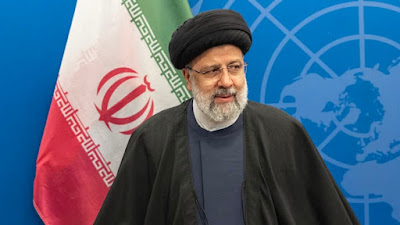Ebrahim Raisi was an Iranian politician who served as eighth president of Iran from 2021 until his death in 2024. A Principlist and a Muslim jurist, he became president after the 2021 election. In his early career, Raisi served in several positions in Iran's judicial system, including as Deputy Prosecutor and Prosecutor of Tehran. For his role on the so-called death committee during the 1988 executions of Iranian political prisoners, he became known as the "Butcher of Tehran". He was sanctioned by the U.S. Office of Foreign Assets Control in accordance with Executive Order 13876. He was accused of crimes against humanity by international human rights organizations and United Nations special rapporteurs. He was later Deputy Chief Justice (2004–2014), Attorney General (2014–2016), and Chief Justice (2019–2021). He was Custodian and Chairman of Astan Quds Razavi, a bonyad, from 2016 until 2019. He was a member of Assembly of Experts from South Khorasan Province, being elected for the first time in the 2006 election. He was the son-in-law of Mashhad Friday prayer leader and Grand Imam of Imam Reza shrine, Ahmad Alamolhoda.
Raisi ran for president in 2017 as the candidate of the conservative Popular Front of Islamic Revolution Forces, losing to moderate incumbent president Hassan Rouhani, 57% to 38.3%. Raisi successfully ran for president a second time in 2021 with 62.9% of the votes, succeeding Hassan Rouhani. According to many observers, the 2021 Iranian presidential election was rigged in favour of Raisi, who was considered an ally of Ali Khamenei. Raisi was often seen as a frontrunner to succeed Khamenei as Supreme Leader, but he died in the 2024 Varzaqan helicopter crash. Considered a hardliner in Iranian politics, Raisi's presidency saw deadlock in negotiations with the U.S. over the Joint Comprehensive Plan of Action (JCPOA) and large-scale protests throughout the country in late 2022, triggered by the death of Mahsa Amini on 16 September. During Raisi's term, Iran intensified uranium enrichment, hindered international inspections, and supported Russia in its invasion of Ukraine. Additionally, Iran launched a missile and drone attack on Israel during the Gaza conflict and continued arming proxy groups like Hezbollah and the Houthi movement.
Early life and education
Ebrahim Raisi was born on 14 December 1960 to a clerical family in the Noghan district of Mashhad. His father, Seyed Haji, died when he was 5. Ancestrally, Raisi was among Husayn ibn Ali (Hussaini) Sayyids, and he was connected to Ali ibn Husayn Zayn al-Abidin Sayyids. Raisi passed his primary-education in "Javadiyeh school"; then started studying in the Hawza (Islamic seminary). In 1975, he went to "Ayatollah Boroujerdi School" in order to continue his education in Qom Seminary.[citation needed] He has claimed to have received a doctorate degree in private law from Motahari University; however, this has been disputed.
Clerical credentials
Raisi began his studies at the Qom Seminary at the age of 15. He then decided to study in the Navvab school for a short time. After that, he went to Ayatollah Sayyed Muhammad Mousavi Nezhad school, where he studied while also teaching other students. In 1976, he went to Qom to continue his studies at the Ayatollah Borujerdi school. He was a student of Seyyed Hossein Borujerdi, Morteza Motahhari, Abolghasem Khazali, Hossein Noori Hamedani, Ali Meshkini and Morteza Pasandideh. Raisi also passed his "KharejeFeqh" (external-Fiqh) to Seyyed Ali Khamenei and Mojtaba Tehrani. According to Alex Vatanka of the Middle East Institute, Raisi's "exact religious qualification" is a "sore point". "For a while" prior to investigation by the Iranian media, he "referred to himself" as "Ayatollah" on his personal website. However, according to Vatanka, the media "publicized his lack of formal religious education" and credentials, after which Raisi ceased claiming to hold the aforementioned rank. After this investigation and criticism he "refer[ed] to himself as hojat-ol-eslam", a clerical rank immediately beneath that of Ayatollah. Raisi subsequently again declared himself an Ayatollah shortly before the 2021 presidential election. The decree by Supreme Leader Ali Khamenei appointing him as President, refers to him as a hojat-ol-eslam.
Judicial career
Early years
In 1981, he was appointed the prosecutor of Karaj. Later on, he was also appointed Prosecutor of Hamadan and served both positions together. He was simultaneously active in two cities more than 300 km away from each other. After four months, he was appointed Prosecutor of Hamadan Province.
Tehran deputy prosecutor
He was appointed Deputy prosecutor of Tehran in 1985 and moved to the capital. After three years and in early 1988, he was placed in the attention of Ruhollah Khomeini and received special provisions (independent from judiciary) from him to address legal issues in some provinces like Lorestan, Semnan and Kermanshah.
Source : Wikipedia








0 Comments